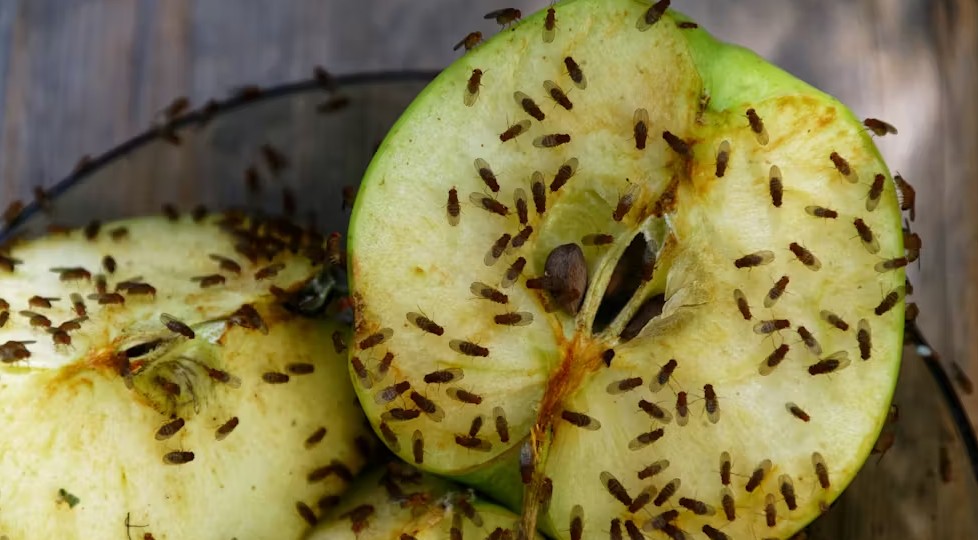Fruit fly invasion: Nairobi homes battle swarms as pests multiply by the hundreds

From Eastlands to Westlands, residents are noticing a sharp rise in these tiny pests, which thrive in warm, humid environments and are especially attracted to ripe fruit, kitchen drains, and sugary leftovers.
Lurking around kitchen drains and ripe fruit, fruit flies—each able to lay up to 500 eggs—have quietly invaded Nairobi homes, pushing residents to find creative and sometimes desperate ways to take back control.
From Eastlands to Westlands, residents are reporting a surge in these tiny pests, which thrive in warm, humid conditions and are particularly drawn to ripe fruit, kitchen drains, and sugary residues.
More To Read
- CS Kagwe orders integrated pest management to save macadamia nuts
- Fridge safety warning: Five common mistakes that put your health at risk
- Activists demand crackdown on unsafe reuse of glass bottles by Kenyan beverage firms
- Kephis to inspect sea vessels and containers at Kenyan ports for pests to curb threats
- India’s new antibiotic drugs poised to tackle drug-resistant infections
While they pose little threat to human health, their sheer numbers and persistence have turned kitchens and bathrooms into daily battlegrounds.
“They’re everywhere, nowadays, I cannot have food lying around anymore, it has to be covered,” says Miriam Wambui, a mother of three from South B.
“I’ve cleaned my kitchen from top to bottom, moved all my fruit into the fridge, and I’m still finding them hovering around. Some friends told me to light a candle to chase them away, but it barely works.”
Experts attribute the outbreak to a combination of seasonal heat, poor food storage practices, and inadequate waste disposal.
“A single female fruit fly can lay up to 500 eggs at once,” says pest control specialist Daniel Ouma.
“If you don’t catch the problem early, you are looking at hundreds of flies within a week.”
Invisible invaders
The scientific name for fruit flies is Drosophila melanogaster, a species drawn to fermenting sugars in food and drink.
The eggs, often too small to notice with the human eye, can hitch a ride into homes on fruits and vegetables, particularly from open-air markets or farms.
Meaning even if your home is spotless, unwashed fruits and vegetables from the market can still bring in fruit fly larvae.
These eggs are often invisible to the naked eye, but once in your kitchen, they can hatch within a day or two, explaining why you suddenly see tiny flies buzzing around your produce.
Once inside, fruit flies waste no time.
Within 24 to 48 hours of laying eggs, larvae begin to hatch in damp areas like sink drains, compost bins, and even the bottoms of empty juice glasses.
They thrive in Nairobi’s current climate, a warm and slightly humid environment, and every kitchen, bathroom, and even indoor plant pot can become a breeding ground if it is not properly maintained.
DIY defence tactics
As the infestation spreads, so do creative homemade defences.
One of the most effective and widely used traps involves a small jar filled with apple cider vinegar and dish soap, covered with perforated plastic wrap.
The scent of the dish soap and vinegar attracts the flies, which then become trapped in the sticky liquid.
Other residents have taken to cleaning utensils after use, freezing their food scraps before disposal, or flushing their drains with hot water, baking soda, and vinegar to prevent hidden larvae from maturing.
“Since I started using vinegar traps, I’ve seen a huge difference,” says Anthony Otieno, a Kilimani resident.
“But you have to stay consistent, replace the traps every couple of days and keep everything dry.”
Are they dangerous?
Though fruit flies are not considered dangerous, city health officials warn that their presence could indicate deeper hygiene issues.
The insects have been shown to carry bacteria like E. coli and Salmonella from one food source to another, though they are unlikely to cause serious illness.
“Fruit flies are more of a warning sign than a direct health threat,” says Dr Fred Jorgensen, a family medicine physician to Good Housekeeping.
“Their rapid reproduction is a sign that food hygiene is being compromised somewhere in the environment.”
As the battle against fruit flies continues, residents are being urged to take proactive steps: rinse fruits and vegetables thoroughly, store perishables in the fridge, clean drains, sinks and bins regularly, and act quickly at the first sign of infestation.
“Don’t wait until you see them,” warns Jorgensen.
“By the time you spot one, there could be hundreds more hatching in your drain.”
Since each female can lay up to 500 eggs at once, Nairobians are discovering that staying vigilant is crucial in the fight against fruit flies, and a little vinegar goes a long way.
Top Stories Today












































